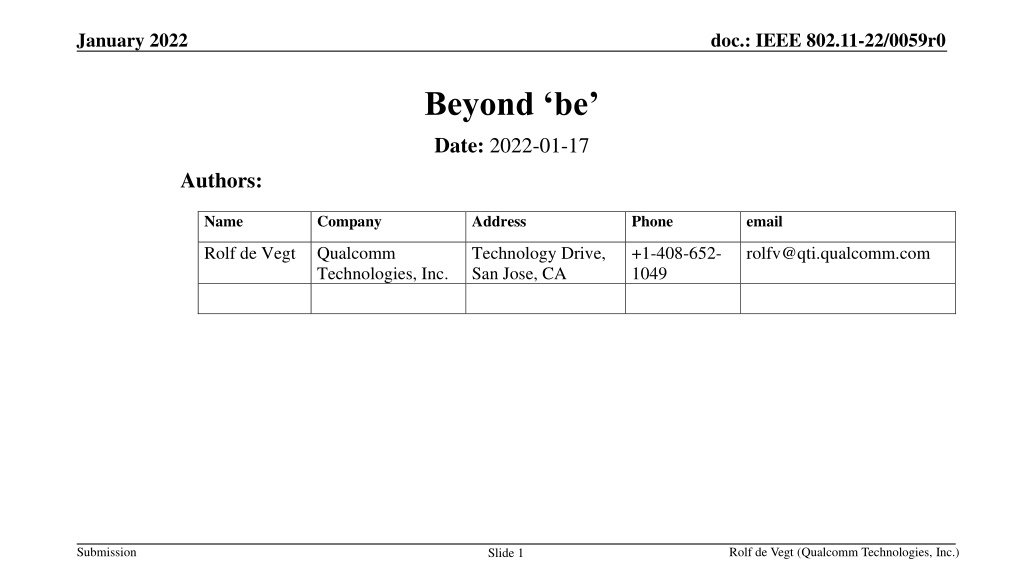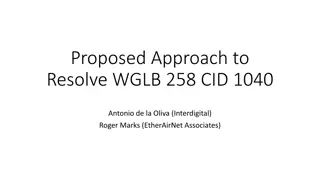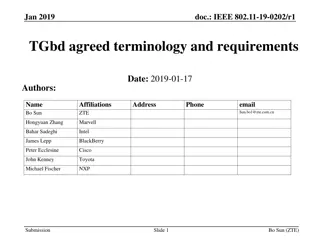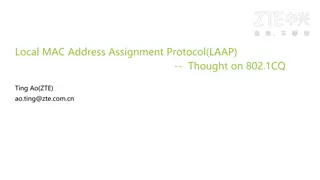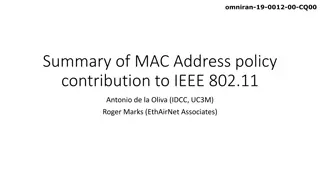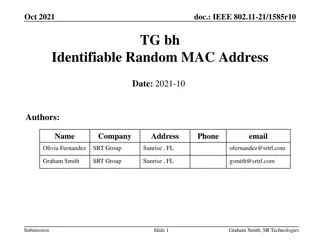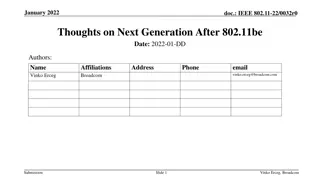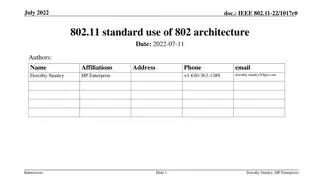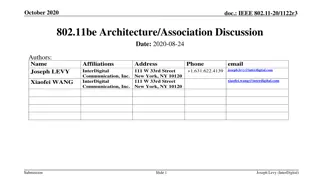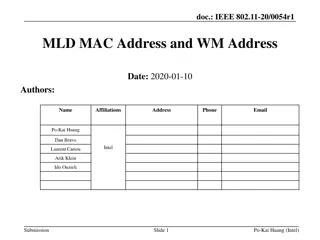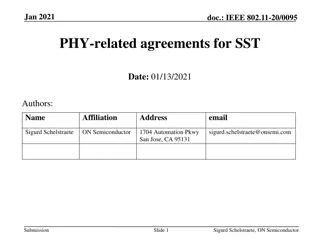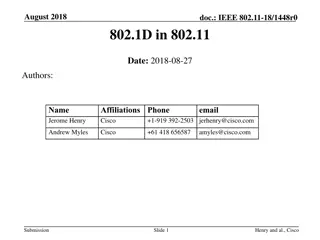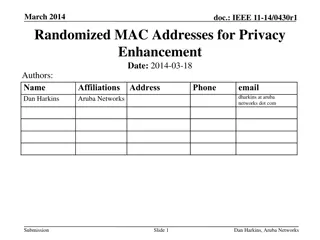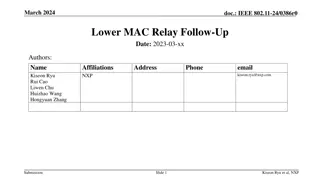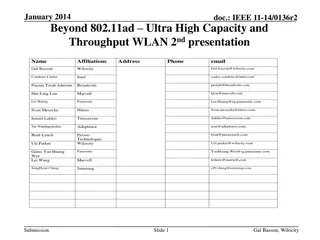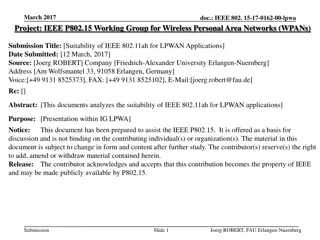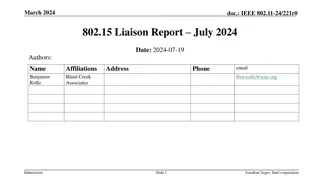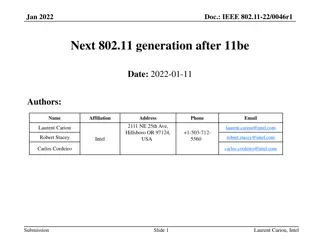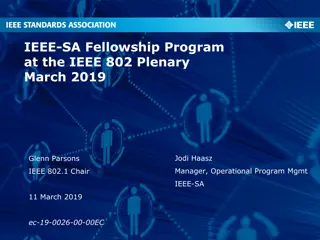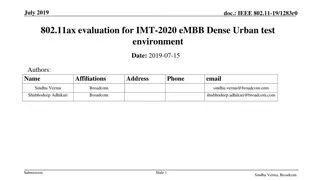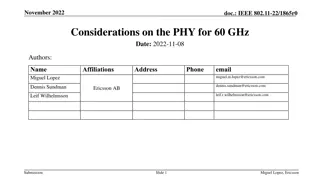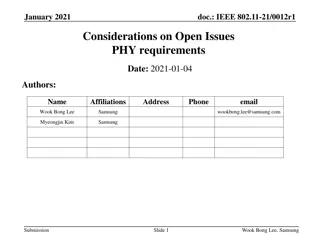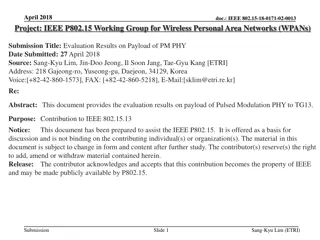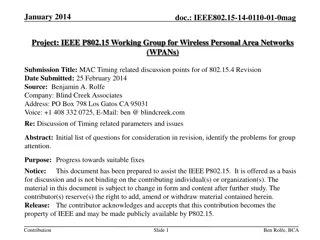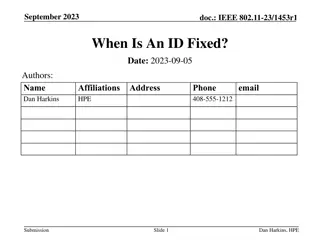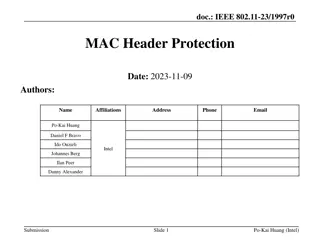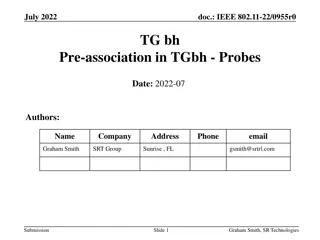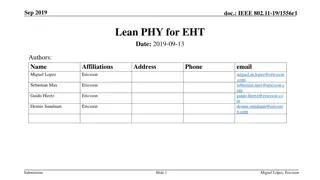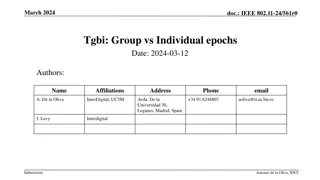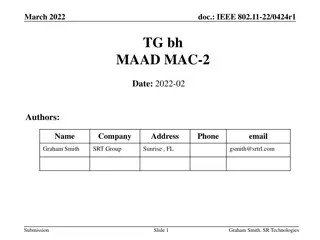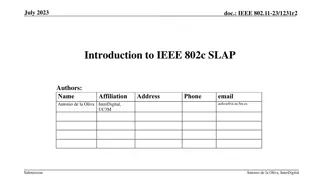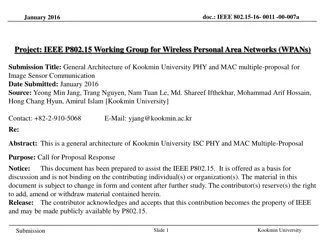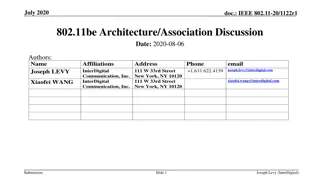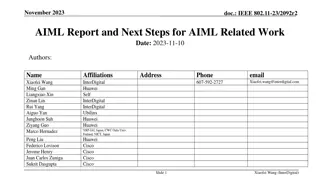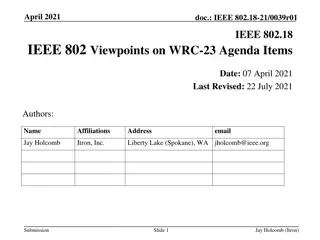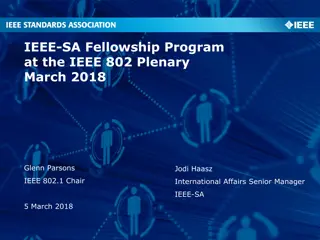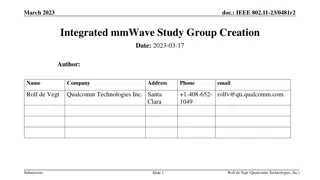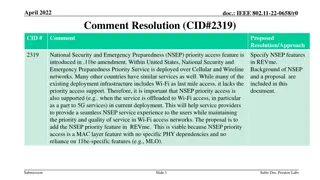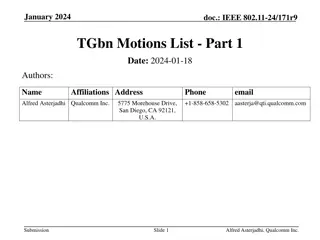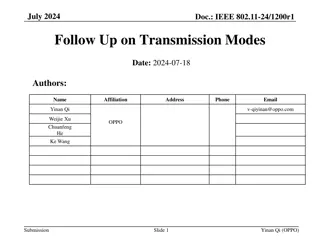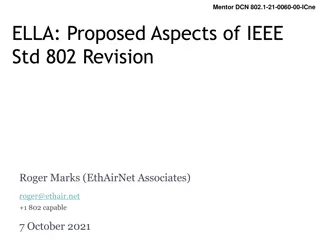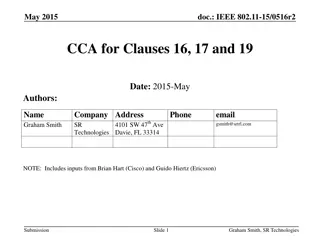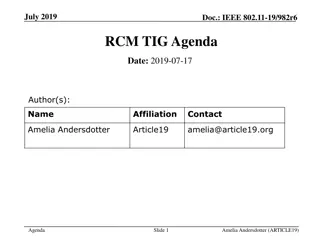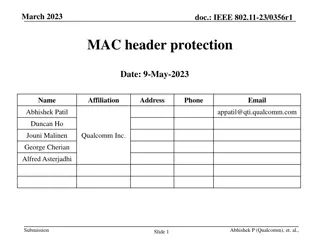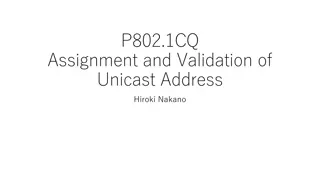IEEE 802.11-22/0059r0 Submission for Next Generation MAC/PHY Standards
Submission by Rolf de Vegt from Qualcomm Technologies, Inc. discusses the need for a new mainstream MAC/PHY standard beyond IEEE 802.11be. The document provides insights on market context, potential timelines, and emerging market requirements for future standards development in the Wi-Fi ecosystem.
Download Presentation

Please find below an Image/Link to download the presentation.
The content on the website is provided AS IS for your information and personal use only. It may not be sold, licensed, or shared on other websites without obtaining consent from the author. Download presentation by click this link. If you encounter any issues during the download, it is possible that the publisher has removed the file from their server.
E N D
Presentation Transcript
January 2022 doc.: IEEE 802.11-22/0059r0 Beyond be Date: 2022-01-17 Authors: Name Company Address Phone email Rolf de Vegt Qualcomm Technologies, Inc. Technology Drive, San Jose, CA +1-408-652- 1049 rolfv@qti.qualcomm.com Submission Rolf de Vegt (Qualcomm Technologies, Inc.) Slide 1
January 2022 doc.: IEEE 802.11-22/0059r0 Abstract Submission on possible timing and themes for a next generation 802.11 mainstream MAC/PHY standards project Submission Rolf de Vegt (Qualcomm Technologies, Inc.) Slide 2
January 2022 doc.: IEEE 802.11-22/0059r0 Topics Introduction and Context Need for a next generation MAC/PHY standard Market Context and potential objectives for a next generation standard Initial inputs on a timeline Proposed Next Steps Submission Slide 3 Rolf de Vegt (Qualcomm Technologies, Inc.)
January 2022 doc.: IEEE 802.11-22/0059r0 Introduction and Context Steady progress in 802.11be standardization Appropriate timing to start early deliberations on a successor mainstream MAC/PHY standard Need to make sure adequate time is allocated to understand: Relevant market and technology developments Needs and requirements of the various ecosystem constituencies This submission is intended to provide preliminary perspectives on the need for a new MAC/PHY amendment, relevant market context and a potential standards timeline Submission Slide 4 Rolf de Vegt (Qualcomm Technologies, Inc.)
January 2022 doc.: IEEE 802.11-22/0059r0 Need for a next generation Mainstream MAC/PHY standard The already defined 802.11be feature set will likely be sufficient for two releases of a WFA Interop Certification program (e.g. Wi-Fi 7 Release 1 and Release 2) 802.11be R2 feature set could be very slim / minimal Important new market requirements are emerging that require support in a subsequent mainstream MAC/PHY standard The Wi-Fi ecosystem could absorb a subsequent MAC/PHY interop program release in the 2027 / 2028 timeframe Historical timelines suggest that an IEEE802.11 Study Group starting 5 years prior is practical and achievable Submission Slide 5 Rolf de Vegt (Qualcomm Technologies, Inc.)
January 2022 doc.: IEEE 802.11-22/0059r0 Market Context: Some Important and Relevant Market Developments Growing importance of metaverse and XR communications Enabling technologies still evolving rapidly (screen resolution, miniaturization, MEC, cloud connectivity) Near-insatiable demand for higher link throughputs and lower latencies Prospect of multiple very high throughput, low latency P2P and Infra users operating in close proximity Likely increasingly stringent regulatory requirements on overall device power consumption Driven by targets to combat/limit climate change, European regulation on per 24 hour power consumption envelopes may lead the way Continued increase in use of remote and hybrid work models Enterprisation of the home Need for high quality video communications capabilities everywhere Significant amounts of 6GHz band spectrum becoming available globally Provides 802.11 technologies with advantages in terms of throughput and capacity Creates a challenge for those geographic markets where no additional spectrum becomes available and network congestion becomes a critical issue Private Cellular networking offerings becoming more mature and easier to deploy With (real or perceived) advantages for Private Cellular over 802.11 in: mobility and roaming over larger areas, reliable coverage, low latency connections, device and user data management and security E.g., for use in Industrial IoT environments Growing Role and importance of Cloud based / centrally managed 802.11 networks Increasing reliance on capture of wireless network data elements Potential for application of Machine Learning capabilities Slide 6 1. 2. 3. 4. 5. 6. Submission Rolf de Vegt (Qualcomm Technologies, Inc.)
January 2022 doc.: IEEE 802.11-22/0059r0 Perspective on high level objectives: 1. Increase Reliability of Wi-Fi Connectivity 2. Reduce Latency for critical applications and enable latency guarantees in spectrum managed environments 3. Enhance manageability of Wi-Fi networks; Incl. manageability of multiple P2P connections E.g., in support of time sensitive networks (TSN) 4. Reduce Device Level power consumption (STA and AP) 5. Enhance Device Roaming Experience 6. Improve Wi-Fi performance in spectrum congested environments Submission Slide 7
January 2022 doc.: IEEE 802.11-22/0059r0 Timeline Considerations 802.11b# (potential scenario) July 2022 Milestone 802.11ax 802.11be Start Study Group PAR Approved Draft 0.1 Draft 1.0 Start Industry Interop Program March 2013 March 2014 March 2016 January 2017 September 2019 Year End 2023E July 2018 March 2019 September 2020 May 2021 March 2023 September 2024 May 2025 Year End 2027 Submission Slide 8 Rolf de Vegt (Qualcomm Technologies, Inc.)
January 2022 doc.: IEEE 802.11-22/0059r0 Proposed Next Steps WNG submissions and discussions on relevant market trends, issues and high level requirements March / May / July Strong preference to only focus on trends issues and high level requirements during H1 2022 and only commence feature submissions in H2 2022 or later Prepare proposal to start a Study Group Bring proposal to start a Study Group to the July 2022 Plenary Submission Slide 9 Rolf de Vegt (Qualcomm Technologies, Inc.)
January 2022 doc.: IEEE 802.11-22/0059r0 BACK UP Submission Slide 10
January 2022 doc.: IEEE 802.11-22/0059r0 Historic Project Durations Stage PAR Approval -> Approved Standard PAR Approval -> D 0.1 D0.1 D1.0 D1.0 -> D 2.0 D2.0 -> Final 11ac 64 mos 29 mos 6 mos 8 mos 22 mos 11ax 68 mos 24 mos 8 mos 10 mos 26 mos Submission Slide 11
